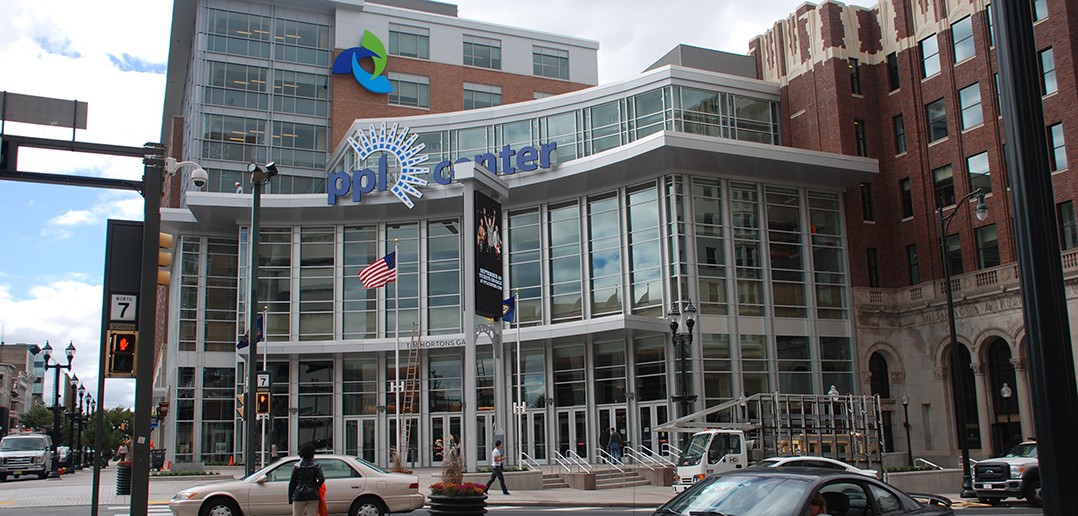When the coronavirus pandemic first hit the U.S. and items began to fly off the shelves of stores throughout the country, the Lehigh Valley IronPigs called, texted, emailed and mailed messages or hand-written notes to all of their clients. The organization invited the clients to let the IronPigs know if they ever needed anything.
Some responded that they were eager for baseball to eventually start up. One fan said they could really use some toilet paper. Another fan just wanted a bottle of bourbon.
The IronPigs delivered on those requests. They procured bourbon through a partner and dropped it off at the fan’s house. They mailed toilet paper to the other.
Rather than focus on the potential danger to their own business, they chose to take the opportunity to strengthen relationships with their clients.
Brian DeAngelis, vice president of sales for the Allentown-based minor league baseball team, said while he oversees a sales team focused on transactions, his department is also a service team focused on relationships and fulfilling clients’ needs.
He said the pandemic has allowed the club, which is the Triple-A affiliate for the Philadelphia Phillies, to be more creative in the ways they connect with clients, and that those small actions, such as delivering toilet paper, can create fans for life.
DeAngelis said clients include season ticket holders and businesses that purchase tickets.
The Lehigh Valley Phantoms, whose year officially came to a close on May 11 after the cancellation of the American Hockey League season, have taken a similar approach of focusing on relationship building with fans during the extended offseason, said Richard Lintker, vice president of Phantoms ticket sales.
Lintker, who arrived from the Washington Capitals and Wizards organization in February, said in such a transactional world, the early end of the season has allowed him to take a step back and look at how he can improve client relationships. He said being more relationship-driven is what he is going to carry forward.
While an increased focus on relationship building and creativity in connecting with fans may be a silver lining during a time of uncertainty in professional sports, DeAngelis said the lack of sales has been detrimental for minor league teams. For the IronPigs, Phantoms, and other minor league teams, ticket sales — not television — drive the vast majority of revenue.
That revenue is what is able to keep these organizations alive.
While Major League Baseball is in the middle of negotiations for a shortened season that will likely include no fans, minor league sports need fans in seats to survive.
As of May 25, the IronPigs have canceled their first 24 home games out of 70. The Phantoms had to forego the final seven home games of their now-canceled season.
With the Phantoms’ 2019-2020 average attendance of 7,147 fans per game, they missed out on roughly 50,000 tickets this season. Using the IronPigs’ average of 8,605 fans per game from the 2019 season, that number sits at over 206,000 tickets missed — and counting.
The financial losses could be devastating.
Calculations show lost revenue for the IronPigs through ticket sales alone stands at at least $90,000 per game. This number factors in the 2019 average attendance per home game and accounts for the $8 general admission ticket and the $11 field-level ticket. Premium seating prices were not taken into consideration.
Through 24 games, the lost revenue is at least $2.16 million based on estimated ticket sales. If the entire season is canceled, that number would skyrocket to at least $6.3 million in lost ticket revenue.
While the IronPigs have resorted to events such as Character-Cruise-Thru’s, a drive-through event featuring popular movie characters, and a parking lot fireworks show to try to bring in some revenue, it nowhere near approaches the type of revenue that would have been brought in during a typical season.
The first Character-Cruise-Thru raised nearly $10,000 for charity, DeAngelis said, while subsequent events are scheduled for profit.
“There’s definitely opportunity there for us to have some revenue, but absolutely miniscule to what we would normally have if we had a season,” DeAngelis said. “It is detrimental in effect to all minor league baseball. We’re in a better position than most teams out of the 160 (teams), but it has definitely hit a lot of them hard.”
In 2019, the IronPigs ranked fourth in attendance out of those 160 minor league teams. Having such a strong fan base, they have been able to retain employees and maintain general operations better than most minor league organizations, said senior operations director Jason Kiesel.
On May 8, NBC Sports Philadelphia reported the Philadelphia Phillies have pledged to retain all full-time employees through October. While DeAngelis and Kiesel both said the IronPigs front-office staff is a separate entity not under the Phillies’ umbrella, the team has managed to retain all 40 to 50 full-time staff members.
Kiesel said he estimates around 90 percent of minor league teams have already laid off most of their staff. Having had the success that the IronPigs enjoyed, he said they’re in a little better of a situation right now.
The future, however, remains murky. Team president and general manager Kurt Landes said via email that the organization is patiently waiting and hopeful to resume a minor league season at some point.
Despite hope still remaining amongst IronPigs staff, both Kiesel and DeAngelis feel a full cancellation of the minor league season is more likely than not.
“For minor league teams, the TV contracts aren’t there, so you’re dependent on the gate revenue, food and beverage, that kind of thing,” Kiesel said. “I don’t think minor league baseball would play without fans when you realistically think about it. The proposal MLB put together for coming back basically says the plan would be no minor league season.”
While the organization has already put together some events in an attempt to gather revenue, DeAngelis and Kiesel both said they are limited by regulations in Pennsylvania and Lehigh County in terms of how many people they can gather for an event. Creativity will continue to be key.
DeAngelis mentioned a potential top golf-type event taking place later in the summer, but he said the logistics could get tricky. Even if Lehigh County moves to the yellow phase by June 5 as stated by Pennsylvania Gov. Tom Wolf, gatherings of more than 25 people will still be forbidden.
“I’m never going to take anything for granted.”
-Richard Lintker, vice president of Phantoms ticket sales
Even with the uncertainty, DeAngelis said the lack of baseball has allowed his team to get more creative and pursue other initiatives to connect with fans in advance of 2021. With many choosing to roll over their 2020 tickets to 2021, DeAngelis said the sales team will have a unique level of certainty with ticket sales if the 2021 season goes ahead as planned.
“The focus is going to be, how are we going to go out and capitalize on some of the new opportunities that this situation has created, and how are we going to deal with some of the challenges that it has created,” DeAngelis said.
Like Lintker, DeAngelis said the pandemic has forced sales teams to tap into their creativity, leading the team to experiment with new digital and social media initiatives as well as becoming more community-centric.
Kiesel and his operations team have faced a different set of challenges. In contrast to taking on new initiatives to bring in revenue, his team had to get creative in cutting costs, wiping out weeks of hard work in preparation for the 2020 season.
Whether it be shutting off all heating and cooling systems, canceling scheduled team trips or storing supplies that would’ve been used during the season, Kiesel said the operations team is essentially in limbo until they hear more information from the MLB.
Kiesel said he has been visiting the stadium once a week just to check on systems and make sure everything remains in good shape.
“We’ve basically pulled the plug,” Kiesel said. “We’ve spent a good amount of money on outfield wall pads, stuff that had to be ordered in, say, January, which we ordered and received, and stuff like that we’re just waiting until we can get in there and put everything up. Who knows when that’ll be.”
The Phantoms, on the other-hand, have been luckier with the timing of the pandemic. While Lintker said there is no fortunate situation for anyone in sports, he recognizes that losing seven out of 38 home games pales in comparison to minor league baseball, which could realistically lose all 70 home games.
The Phantoms, like the IronPigs, have given their fans multiple options of how to receive credit for their lost tickets, including rolling them over for a package for the 2020-2021 season, donating the cost to front-line workers or receiving a refund.
Lintker said the Phantoms have also been able to retain all front-office staff thus far.
While Lintker is hopeful the 2020-2021 AHL season can begin in October, he also recognizes the season could be pushed back and said he and his team are planning for a variety of scenarios.
Lintker said, like minor league baseball, minor league hockey differs from the NHL in that it doesn’t make sense for minor league teams to have games without fans. While he said no one can predict what the future looks like, he is doing all he can now to connect with fans and take a step back to examine their organizational processes.
“Right now it is all about being connected to your fans in some way, shape or form, and these are things that every team wishes they had more time to do in the past,” Lintker said. “Well, now we have all this time, and now it’s all about learning about your fans, connecting with your fans and reminding them we’re still here. We can’t wait to get back.”
Lintker said the Phantoms have a unique opportunity to evaluate their customer relationship management in ways they wouldn’t have had otherwise.
While Kiesel, DeAngelis and Lintker all said they have positively been forced to get more creative during this time, the effect of the coronavirus on these organizations is detrimental nonetheless. While the IronPigs and Phantoms may be more fortunate than some, minor league sports — particularly baseball — are in a difficult spot, DeAngelis said.
“I’m never going to take anything for granted,” Lintker said. “You’re never going to take a Monday night game that might only have half the arena full because it’s a Monday night and early in the season — I’m never going to take those games for granted.”






Comment policy
Comments posted to The Brown and White website are reviewed by a moderator before being approved. Incendiary speech or harassing language, including comments targeted at individuals, may be deemed unacceptable and not published. Spam and other soliciting will also be declined.
The Brown and White also reserves the right to not publish entirely anonymous comments.